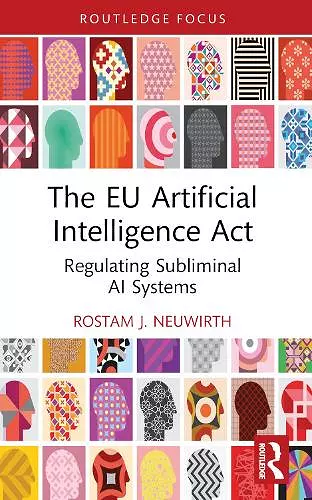The EU Artificial Intelligence Act
Regulating Subliminal AI Systems
Format:Paperback
Publisher:Taylor & Francis Ltd
Published:27th May '24
Should be back in stock very soon
This paperback is available in another edition too:
- Hardback£54.99(9781032333755)

AI in combination with other innovative technologies promises to bring unprecedented opportunities to all aspects of life. These technologies, however, hold great dangers, especially for the manipulation of the human mind, which have given rise to serious ethical concerns. Apart from some sectoral regulatory efforts to address these concerns, no regulatory framework for AI has yet been adopted though in 2021 the European Commission of the EU published a draft Act on Artificial Intelligence and UNESCO followed suit with a Recommendation on the Ethics of Artificial Intelligence.
The book contextualises the future regulation of AI, specifically addressing the regulatory challenges relating to the planned prohibition of the use of AI systems that deploy subliminal techniques. The convergence of AI with various related technologies, such as brain–computer interfaces, functional magnetic resonance imaging, robotics and big data, already allows for "mind reading" or "dream hacking" through brain spyware, as well as other practices that intrude on cognition and the right to freedom of thought. Future innovations will enhance the possibilities for manipulating thoughts and behaviour, and they threaten to cause serious harm to individuals as well as to society as a whole.
The issue of subliminal perception and the ability to deceive and manipulate the mind below the threshold of awareness causes severe difficulties for law and democracy and raises important questions for the future of society. This book shows how cognitive, technological, and legal questions are intrinsically interwoven, and aims to stimulate an urgently needed transdisciplinary and transnational debate between students, academics, practitioners, policymakers and citizens interested not only in the law but also in disciplines including computer science, neuroscience, sociology, political science, marketing and psychology.
Foremost expert in the international field of legal synaesthesia, Rostam Neuwirth reminds us in this engagingly complex critique of proposed EU regulation in AI systems, that in this age of paradox and oxymora, the mind, with its elaborately interactive sensory intersectionality involving cognition, knowledge, and reality, is a site precariously positioned for manipulation through systems of artificial intelligence that seek to control awareness and perception through subliminal techniques emboldened by irresponsible regulation. Law must protect our foundational freedom as humans to think, to feel, and engage with thoughts, feelings, and the reality that comes from this chaotic overlap.
Sarah Marusek, University of Hawai‘i Hilo (USA) and author of "Synesthetic Legalities: Sensory Dimensions of Law and Jurisprudence"
Rostam J. Neuwirth’s book on the subliminal effects of AI is both original and timely. It is original because Neuwirth combines discourses from the fields of vulnerability theory, AI and neuroscience in a unique manner. The book is timely because the earlier one understands AI’s subliminal effects, the higher is the chance that we can avoid that the concept of ‘private thought’ becomes an oxymoron. Neuwirth’s latest book is thus essential reading for anyone committed to the protection of human dignity and human autonomy in the digital realm.
Valentin Jeutner, Lund University (Sweden) and author of "Irresolvable Norm Conflicts in International Law: The Concept of a Legal Dilemma"
The global challenges of the XXI century spur humans to deal with Complex Systems. In my book, entitled "Untangling Complex Systems: A Grand Challenge for Science", I show that Artificial Intelligence (AI) turns out to be a valuable tool to tackle Complexity. The development of AI brings humanity to the brink of a fourth technological revolution that will fundamentally alter the way humans live, work, and conceive themselves. There are intelligent machines that "assist", others that "augment" humans, and finally others that are "autonomous". These intelligent machines, which interact with humans, help face complex scenarios but raise ethical questions. The brilliant and farsighted Neuwirth’s book presents the general context of the future regulation of AI. It specifically addresses the regulatory challenges related to the planned prohibition of "the use of an AI system that deploys subliminal techniques beyond a person’s consciousness". Through a transdisciplinary examination of AI's legal, technological, linguistic and cognitive aspects, Neuwirth legitimately concludes that control of the mind should remain the personal domain of every human and the term "private thought" should not become an oxymoron. Neuwirth’s book is a "must-read" for anyone who wants to know more about the regulation of subliminal AI systems.
Pier Luigi Gentili, Department of Chemistry, Biology and Biotechnology, University of Perugia (Italy)
A highly important and timely discussion of the concept of subliminal manipulation at a time when the EU prepares to be one of the first major regulators of artificial intelligence. It is crucial that more experts like Professor Neuwirth contribute to the topic of reducing the risks of AI manipulation.
Risto Uuk, Policy Researcher, Future of Life Institute (FLI)
ISBN: 9781032333830
Dimensions: unknown
Weight: 270g
130 pages